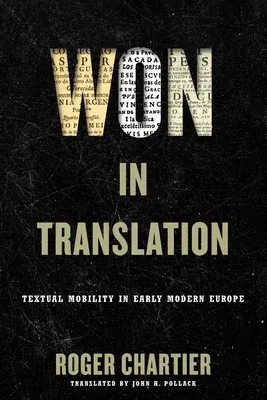In Won in Translation Roger Chartier, one of the world's leading
historians of books, publishing, and reading, considers the mobility of
the early modern text and the plurality of circulating versions of the
same work. The agent for both is translation, for through their lexical,
aesthetic, and cultural decisions, translators always assign new meaning
or new status to what they translate.
Won in Translation proceeds by way of four case studies, three
dedicated to works originally in Spanish, the fourth to a Portuguese
dramatic adaptation of Don Quixote. Bartolomé de Las Casas' Brevísima
relación de la destrucción de las Indias, first printed in 1552, was a
powerful instrument for the construction of what was later called the
"black legend" of Spanish monarchy. Baltasar Gracián's Oráculo Manual,
published in 1647, became the most famous courtier's manual in Europe.
Both traveled more widely and were translated more often than any other
books of their era. For Chartier they illustrate the great power of
translation, which allowed Las Casas' account to be placed in multiple
and successive contexts and enabled Gracián's book to take on a range of
meanings it had not originally had. Chartier's next two chapters are
devoted to plays, one by Lope de Vega, the other by Antônio José da
Silva. In the case of Lope's Fuente Ovejuna, the "translation" was one
from historical chronicle to dramatic performance. In Antônio José da
Silva's Vida do Grande D. Quixote, the textual migration is twofold,
as Cervantes' hero moves from Spanish to Portuguese and from novel to
play.
In an Epilogue, Chartier moves three centuries forward to consider the
paradox that it is the absolute immobility of the text, "reinvented"
word for word, that creates its mobility in Jorge Luis Borges' fiction
"Pierre Menard, Author of the Quixote." Works are transformed through
changes of genre or language, to be sure; but even when the texts remain
fixed, their readers give them different or inverted meaning.

